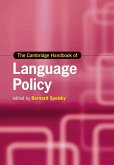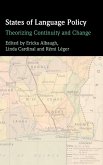Short description/annotation
An up-to-date introduction exploring many debates at the forefront of modern national language policy.
Main description
Language policy is an issue of critical importance in the world today. In this up-to-date introduction, Bernard Spolsky explores many debates at the forefront of language policy: ideas of correctness and bad language; bilingualism and multilingualism; language death and efforts to preserve endangered languages; language choice as a human and civil right; and language education policy. Through looking at the language practices, beliefs and management of social groups from families to supra-national organizations, he develops a theory of modern national language policy and the major forces controlling it, such as the demands for efficient communication, the pressure for national identity, the attractions of (and resistance to) English as a global language, and the growing concern for human and civil rights as they impinge on language. Two central questions asked in this wide-ranging survey are of how to recognize language policies, and whether or not language can be managed at all.
Table of contents:
1. Language practices, ideology and beliefs, and management and planning; 2. Driving out the bad; 3. Pursuing the good and dealing with the new; 4. The nature of language policy and its domains; 5. Two monolingual polities - Iceland and France; 6. How did English spread(?)33;; 7. Does the US have a language policy or just civil rights(?)33;; 8. Language rights; 9. Monolingual polities under pressure; 10. Monolingual polities with recognised linguistic minorities; 11. Partitioning language space - two, three, many; 12. Resisting language shift; 13. Conclusions.
An up-to-date introduction exploring many debates at the forefront of modern national language policy.
Main description
Language policy is an issue of critical importance in the world today. In this up-to-date introduction, Bernard Spolsky explores many debates at the forefront of language policy: ideas of correctness and bad language; bilingualism and multilingualism; language death and efforts to preserve endangered languages; language choice as a human and civil right; and language education policy. Through looking at the language practices, beliefs and management of social groups from families to supra-national organizations, he develops a theory of modern national language policy and the major forces controlling it, such as the demands for efficient communication, the pressure for national identity, the attractions of (and resistance to) English as a global language, and the growing concern for human and civil rights as they impinge on language. Two central questions asked in this wide-ranging survey are of how to recognize language policies, and whether or not language can be managed at all.
Table of contents:
1. Language practices, ideology and beliefs, and management and planning; 2. Driving out the bad; 3. Pursuing the good and dealing with the new; 4. The nature of language policy and its domains; 5. Two monolingual polities - Iceland and France; 6. How did English spread(?)33;; 7. Does the US have a language policy or just civil rights(?)33;; 8. Language rights; 9. Monolingual polities under pressure; 10. Monolingual polities with recognised linguistic minorities; 11. Partitioning language space - two, three, many; 12. Resisting language shift; 13. Conclusions.









